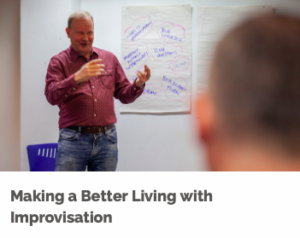Why you should insist your facilitator is a skilled improviser too
‘Hello I’m an improviser’
When you are introducing yourself, it’s good to create a frisson of interest. Much of the time I’ll say I’m a facilitator. It’s accurate enough, even if it’s rather vague and has a broad range of meanings.
I prefer to introduce myself as an ‘Improviser’; it’s better both for its rarity value and greater precision.
And of course there is an overlap: facilitators and improvisers alike are meant to be comfortable in situations of uncertainty, making things up as they go along.
I made the following – doubtless incomplete – list of what you can expect from a skilled improvising facilitator, during an ODIN meeting, kick-started by Bill Critchley and Chris Rogers, called ‘The craft of facilitation from a complexity perspective’. ODIN is a network of Organisational Development practitioners that gathers monthly at CASS Business School and invariably stimulates fruitful talk.
Let’s suppose that the facilitator is brought in to help a meeting (or series of meetings) go better. What can you expect?
- The facilitator is there to run an effective process, one that gets to the desired result, whether that’s reaching a consensus, taking a decision or something else. There will be a Design for the event, which the facilitator implements, assuming all goes well…
- If it doesn’t go so well, then the facilitator should be equipped to change the process, adjusting and adapting as needed.
- The facilitator ensures fairness, taking care to give everyone the opportunity to contribute. That might mean inviting all the participants to join the conversation, or it could go further to encompass inviting others to join (or leave!) a group.
- The facilitator offers an independent voice and perspective, entitled to ask the pertinent questions.
- A facilitator exercising curiosity will get more out of people, prompting useful and new lines of inquiry.
- With a sense of what’s going on, the facilitator knows when to move on, and when it may be worth disturbing collusion and conformity.
All of these are improvisational and deal with complexity. All are exercised in the moment. There’s no knowing in advance when or whether there will be a need to abandon the details of a plan and do something emergently better.
All of the above tasks can be done well or badly. Being good in those unpredictable moment is a skill.
Get free tips on how to develop confidence and creativity straight into your inbox.
Paul Jackson Associates Limited. A registered company in England and Wales.
Company Number 09564618. VAT Number GB 213 37981.
Registered Address 10 Greville House, Lower Road, Harrow on the Hill, Middlesex, HA2 0HB.
Postal Address 34a Clarence Road, St Albans, Hertfordshire, AL1 4NG
Telephone 01727 843 820
Mobile 07973 953 586
© 2009-2016 Paul Jackson Associates / The Improvisation Academy – All Rights Reserved



![DJI Systems - web design | marketing | admin systems | consulting - [ anglesey / wales ] DJI Systems - web design | marketing | admin systems | consulting - [ anglesey / wales ]](https://djisystems.com/banners/DJI_WebBanner_lt.png)
